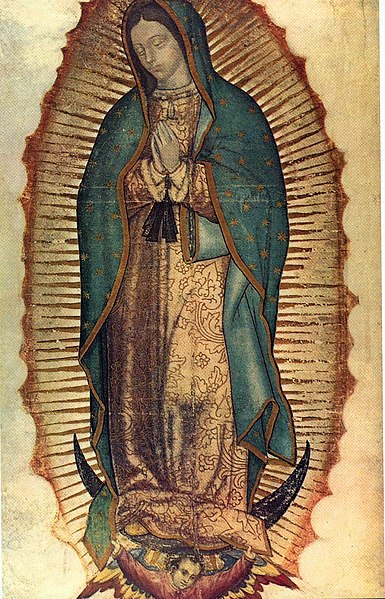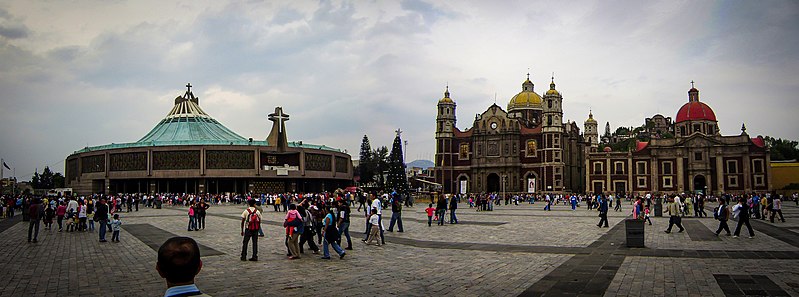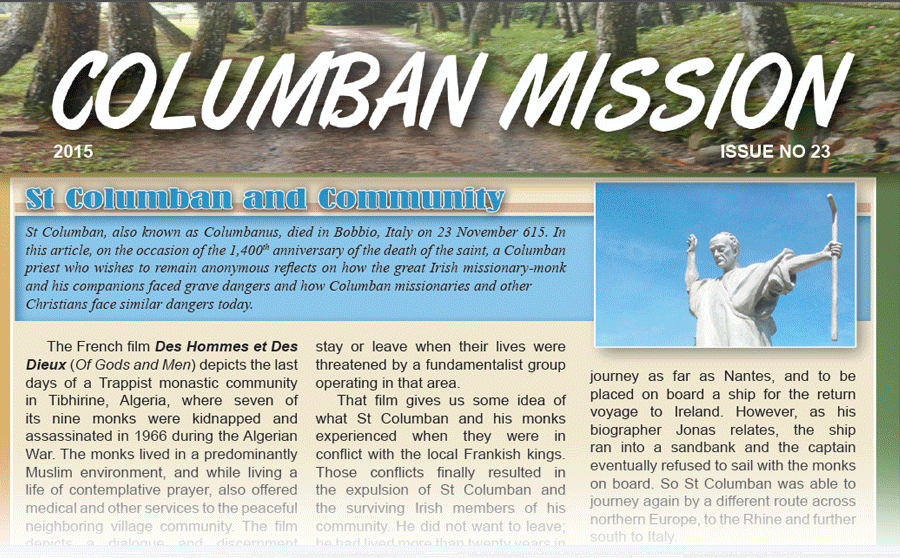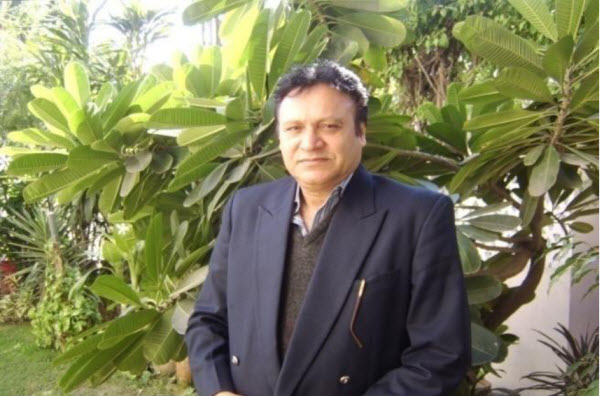Misyon Online - May-June 2013
Pulong ng Editor
A seminarian on ‘KP’ for two years in the South Korean Army
By Jehoon Augustine Lee
The author is a Columban seminarian from the Republic of Korea on First Mission Assignment in Quezon City. Here he tells us about his mandatory two-year military service when he was already a seminarian, nearly all of which he spent in the very unglamorous ‘Kitchen Patrol’ or ‘KP’.

In my native country, South Korea, all males between the ages of 18 and 35 who are physically and mentally able are mandated by Korean law to perform two years of military service. Koreans require this military service as a part of their national duty; there is a perceived need to share in national defense as well as prepare for potential war with North Korea.
A Visit to Tepeyac, Mexico
By Vissia Hernandez
We celebrate the feast of Our Lady of Guadalupe, the secondary Patroness of the Philippines and Protectress of Unborn Children, on December 12. Tepeyac, or the Hill of Tepeyac, Mexico, is where the Blessed Virgin appeared to San Juan Diego in 1531. The shrine of Nuestra Señora de Guadalupe, Our Lady of Guadalupe, is one of the most visited in the world. Vissia Hernandez has written previously for Misyon.

‘It’s like Baclaran’,was my first impression, as I got off the city bus. Stores and stalls selling everything from recuerdos y zapatos (souvenirs and shoes) to comidas y bebidas (food and drink) line both sides of a pedestrian area leading to La Villa (‘the town’, referring to the Basilica compound). A brisk five-minute walk away, behind a tall fence, towers an ancient brick church – the old Basilica, with its imposing yellow dome, twin bell-towers and ornate facade.
As more and more people were streaming towards the gates, I qualified my first impression, ‘It’s like Baclaran on a first Wednesday!’ Excitement mounted with each step until I finally reached the gates of La Villa. Inside, folk dancers with tall headdresses and fierce masks were performing a ritual dance. As I surveyed the wide expanse of Plaza Mariana with its many churches and chapels, a baptistery and a small hill, I was reminded of the Marian shrine complexes in Lourdes and Fatima, only this time, the hordes of pilgrims were predominantly Mexican, and the atmosphere familiarly ‘fiesta’. People were carrying around big and small images, even altars and carrozas of their beloved patroness, reminiscent of Filipino devotees cradling treasured Sto Niños in their arms during the January processions. Instantly, I felt at home!

Plaza Mariana with the New Basilica, the Old Basilica and the Temple of the Capuchin Nuns
The moment we have been waiting for
by Fr Dan Harding
The author is an Australian Columban who worked in Chile for many years. He is now editor of The Far East, the Columban magazine in Australia and New Zealand.

On 4 June 1770 Captain Cook sailed into a passage through the Great Barrier Reef that was surrounded by beautiful continental islands. He was on his historic voyage of discovery up the east coast of Australia. These islands and the sea passage were named the Whitsunday Islands and Passage after the liturgical celebration of the day, Whitsunday (also known as ‘Whitsunday’ or ‘Whitsun’). Actually Cook had miscalculated his date and it was really the following day, Whit Monday.

Hill Inlet, Whitsunday Islanda the largest of the Whitsunday Islands
What is this liturgical celebration called Whitsunday? It is another name for the second most important day after Easter in the Church’s liturgical calendar - the great Solemnity of Pentecost. The name Whitsunday comes from White Sunday when in Medieval times, those who had been baptized seven weeks earlier at Easter donned again their white baptismal robes. Some baptisms also took place at this time.
Angels in a Jungle in PakistanBy Fr Paul McMahon The author is a Columban priest from Belfast, Northern Ireland, and tells the story of ‘Angels’ from northern Pakistan, Muslims students, helped a wedding party of Catholics on a night-time journey through a jungle. The article is taken from the December 2012 Newsletter of the Pakistan Mission Unit of the Columbans.
Mr William Raza has been the assistant to the House-in-Charge at the Columban House in Lahore for the last 25 years. Recently he and his extended family formed a wedding party to travel from Lahore with his nephew who was to get married in Karachi. The journey of 1400 kilometers was to bring unexpected adventures and lessons on how God provides angels along the way to look after us. Even in the least expected places!
Angels in JapanBy Fr Joseph Joyce After almost 35 years of priestly ministry, I was given the precious privilege of a sabbatical year. To make best use of the time, I decided that, inst On this pilgrimage, I resolved to do three things. Firstly, I would adopt a ‘contemplative attitude’, opening myself as much as possible to every thing and every one, and letting myself be impacted by what I encountered. Secondly, I would ‘read’ my experiences, reflecting each evening on my encounters with people and life as I found them. And thirdly, I would try to discern from it all how God might be guiding me for the future. Thus, I set out on a journey that took me to Hong Kong, Mainland China, Taiwan, Korea, and Japan. As I travelled through the various countries, I had, of course, many interesting experiences, but one of the most outstanding occurred in Japan.
|

May-June 2013

The Veil of Veronica, El Greco, 1580-82 (Web Gallery of Art)
For the Lord is righteous; he loves justice. The upright will see his face.
~ Psalm11:7 (Christian Community Bible) ~
+++
|
|
|---|
The poverty that Jesus means – that the prophets mean – presupposes above all inner freedom from the greed for possession and the mania for power. This is a greater reality than merely a different distribution of possessions, which would still be in the material domain and thereby make hearts even harder. It is first and foremost a matter of purification of heart, through which one recognizes possession as responsibility, as a duty towards others, placing oneself under God's gaze and letting oneself be guided by Christ, who from being rich became poor for our sake (cf. 2 Cor 8: 9). Inner freedom is the prerequisite for overcoming the corruption and greed that devastate the world today. This freedom can only be found if God becomes our richness; it can only be found in the patience of daily sacrifices, in which, as it were, true freedom develops. It is the King who points out to us the way to this goal: Jesus, whom we acclaim on Palm Sunday, whom we ask to take us with him on his way.
~Pope Benedict XVI, Homily on Palm Sunday, 9 April 2006, St Peter’s Square, Vatican City, 21st World Youth Day.
+++

Is blessing objects exclusive to priests?
I wanted to know more about holy water because tomorrow is Easter Sunday and I want to teach my little children why we're getting holy water from the church for our home.
Father Seán, if I have strong faith in God and believe in the power of holy water, and I have newly-bought candles and rosaries at home that are not blessed, can I bless them with the holy water myself? Or is it only priests who have the power to bless candles and other religious objects?
In line with the article here, cyber blessing is the newest way of blessing others just like what you're doing here, Father Seán! I do so too on my own blog! Isn't it just great, Fatherr! To be able to bless strangers on the net, with words and teachings of the Lord and of His church!
May the Father bless you, your family and your sheep a thousand-fold, Father Seán!




 ead of studying books, I would study people and cultures in some of our Columban mission countries. I would also make the study a kind of pilgrimage.
ead of studying books, I would study people and cultures in some of our Columban mission countries. I would also make the study a kind of pilgrimage.